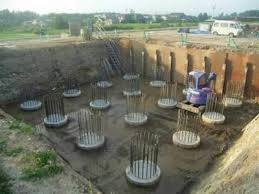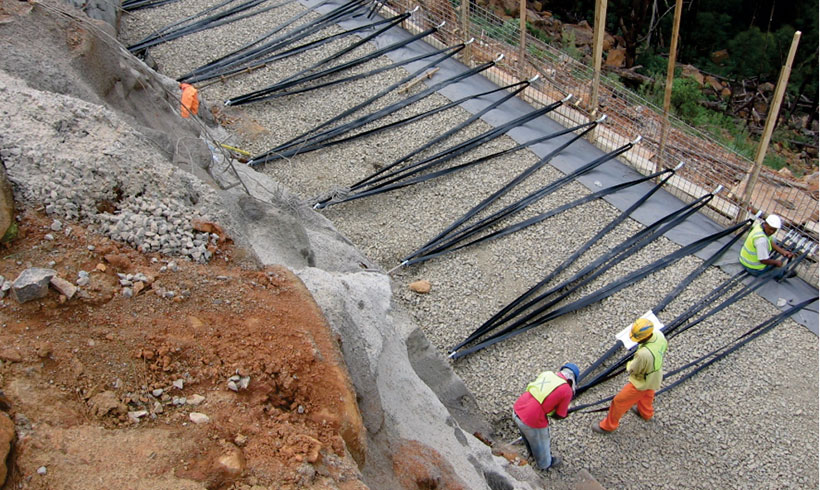Comprehending the Principles: About Geotechnical Engineering in Modern Construction
Comprehending the Principles: About Geotechnical Engineering in Modern Construction
Blog Article
The Importance of Geotechnical Design in Resolving Ecological Obstacles and Enhancing Building And Construction Security
Geotechnical design works as a foundation in the intersection of environmental stewardship and construction safety and security, giving essential understandings right into the behavior of soil and rock under numerous problems. This self-control not only addresses pushing ecological difficulties such as soil disintegration and groundwater security but also boosts the toughness of infrastructure versus all-natural risks. By implementing critical website investigations and customized mitigation measures, geotechnical designers play a crucial role in guarding both human lives and environmental integrity. The complexities of these obstacles increase important inquiries about the future instructions of this field and its effects for sustainable growth.

Function of Geotechnical Engineering
Geotechnical engineering plays a crucial role in the design and construction of infrastructure by resolving the habits of dirt and rock materials under numerous problems. This field of engineering is necessary for comprehending the communication between structures and the ground, which includes determining the load-bearing ability of dirt, examining stability, and predicting potential negotiation or failing.
Geotechnical engineers are in charge of performing site examinations, which include sampling and screening soil and rock to collect information on their physical and chemical residential or commercial properties. This information is essential for creating foundations, preserving walls, and various other earth-retaining structures that make certain security and longevity. In addition, geotechnical engineering educates the choice of suitable construction approaches and materials, therefore reducing threats connected with dirt habits.
Furthermore, the combination of geotechnical engineering concepts right into urban preparation and ecological management is essential for resolving difficulties such as ground contamination and groundwater monitoring. By understanding geotechnical elements, designers can create sustainable remedies that improve the strength of infrastructure against natural dangers, while also advertising ecological stewardship. Inevitably, the function of geotechnical design is important for attaining safe, resilient, and ecologically aware building and construction techniques.
Dirt Disintegration Mitigation
Soil erosion presents a significant risk to both environmental stability and facilities stability, influencing approximately 24 billion bunches of fertile soil shed annually worldwide. This phenomenon is intensified by aspects such as logging, urbanization, and inadequate farming techniques. Geotechnical design plays a crucial duty in developing reliable dirt disintegration reduction approaches that guard both the setting and building and construction jobs.
One technique involves the application of erosion control methods such as vegetation growing, which maintains soil through root systems. In addition, the building and construction of preserving terraces and wall surfaces can successfully decrease surface runoff and shield at risk areas from erosion. Correct drain style is also crucial; it decreases water build-up and directs excess drainage far from crucial frameworks.
In addition, geotechnical engineers employ dirt stabilization strategies, such as the application of geotextiles and naturally degradable mats, to boost soil communication and avoid degradation - geotechnical specialist. Routine monitoring and analysis of erosion-prone sites make it possible for timely treatments, guaranteeing lasting sustainability. By integrating these approaches, geotechnical engineering not just mitigates the influences of soil erosion yet also adds to the resilience of facilities against environmental obstacles, ultimately promoting a more secure and much more lasting built atmosphere
Groundwater Defense Techniques
Groundwater functions as a vital resource for drinking water, farming, and industrial procedures, making its defense important for ecological sustainability and public wellness. Effective groundwater security methods are critical in reducing contamination dangers and making certain the longevity of this resource.

Routine surveillance of groundwater high quality is also crucial, allowing very early detection of contamination resources and assisting in prompt remediation initiatives. Utilizing innovative innovations, such as geophysical studies and remote sensing, help in identifying possible threats to groundwater books.
Furthermore, public education and stakeholder involvement are important, cultivating community assistance for groundwater protection efforts. geotechnical companies in south africa. By incorporating regulatory procedures, technical improvements, and area involvement, we can produce a thorough framework that safeguards groundwater resources while advertising lasting growth and construction methods
Landslide Danger Monitoring
Landslides pose considerable dangers to both human safety and security and infrastructure, making effective danger administration approaches essential. Geotechnical engineering plays an important duty in recognizing, assessing, and mitigating landslide risks. An extensive understanding of slope stability, soil auto mechanics, and hydrology is crucial for creating reliable risk monitoring strategies.
The initial action in landslide threat monitoring entails detailed website examinations, which consist of geological mapping and dirt screening. These examinations assist engineers assess the capacity for landslides by identifying crucial elements such as slope angles, soil make-up, and water web content. Making use of sophisticated innovations such as remote noticing and geophysical surveys can enhance the precision of these analyses.
Once threats are identified, appropriate reduction procedures can be implemented. These may include design services such as keeping walls, water drainage systems, and incline stabilization techniques. Checking systems must be established to identify indications of ground movement and adjustments in water levels, permitting for positive treatments.

Enhancing Construction Safety
Construction sites often present a myriad of hazards that can jeopardize employee safety and security and task honesty. Geotechnical design plays an essential duty in improving building safety by providing essential insights right into subsurface problems. With extensive soil and rock analysis, geotechnical designers can determine prospective risks, such as dirt instability, groundwater problems, and seismic vulnerabilities, which may endanger the safety and security of building activities.
Applying geotechnical services, such as appropriate foundation design and the use of retaining frameworks, mitigates these risks dramatically. These remedies not just guarantee the security of the structures being constructed but likewise develop a safer working atmosphere for building and construction personnel.
Moreover, fostering a culture of security with training and adherence to established security procedures additionally improves building and construction website safety and security. By incorporating geotechnical expertise right into the preparation and implementation stages, building and construction tasks can accomplish greater security requirements, eventually safeguarding workers and ensuring successful task conclusion.
Verdict
In verdict, geotechnical engineering offers as an important discipline in advertising and tackling ecological obstacles building safety and security. Through effective why not try here dirt erosion mitigation, groundwater defense techniques, hop over to here and landslide threat management, geotechnical designers add to the advancement of resistant infrastructure.
Geotechnical design offers as a cornerstone in the crossway of ecological stewardship and construction security, giving vital understandings into the behavior of dirt and rock under numerous conditions. Geotechnical engineering notifies the option of appropriate building approaches and products, thereby lessening threats linked with soil actions.
Geotechnical engineering plays an essential duty in establishing reliable dirt erosion reduction strategies that protect both the atmosphere and building tasks.
In addition, geotechnical engineers employ soil stabilization methods, such as the application of geotextiles and naturally degradable floor coverings, to boost dirt communication and protect against degradation. Through comprehensive soil and rock analysis, geotechnical engineers can identify potential risks, such as soil instability, groundwater issues, and seismic vulnerabilities, which may compromise the safety of construction activities.
Report this page